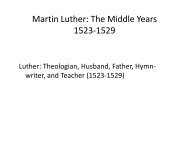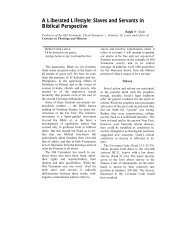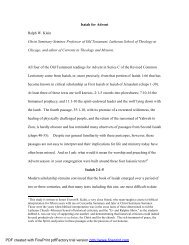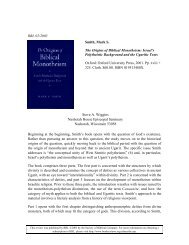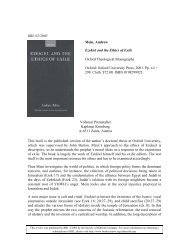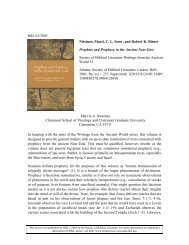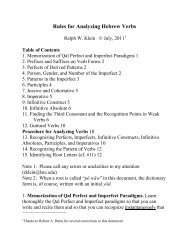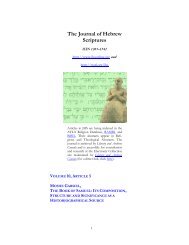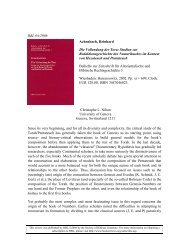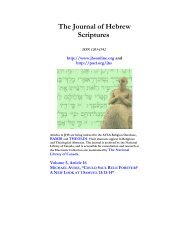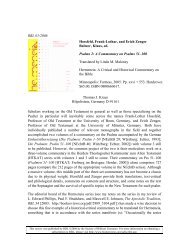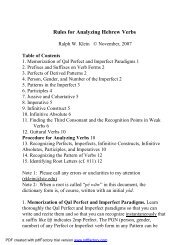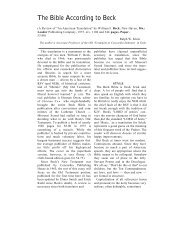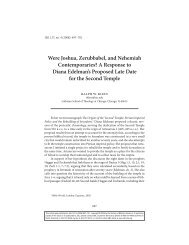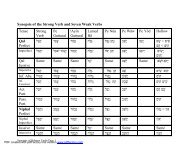“GO, I BEG YOU, TAKE YOUR BELOVED SON AND SLAY HIM ...
“GO, I BEG YOU, TAKE YOUR BELOVED SON AND SLAY HIM ...
“GO, I BEG YOU, TAKE YOUR BELOVED SON AND SLAY HIM ...
You also want an ePaper? Increase the reach of your titles
YUMPU automatically turns print PDFs into web optimized ePapers that Google loves.
8 isaac kalimi<br />
(2) 1 Chr. 21:1 recounts: “And Satan stood up against Israel and<br />
provoked David to make a census of Israel,” while the earlier parallel text<br />
recounts: “Again the anger of the Lord was kindled against Israel, and<br />
he incited David against them, saying, ‘Go, number Israel and Judah”<br />
(2 Sam. 24:1). 25<br />
The very midrashic feature concerning the Aqedah was already developed<br />
in the pre-Rabbinic era. The book of Jubilees (ca. 161–140 B.C.E.)<br />
states that “Prince Mastema” (a parallel term to Satan, devil, persecuting<br />
demon) 26 pushed God to test Abraham, although he did not doubt<br />
the capacity of Abraham to pass the test as did the Satan in the case<br />
of Job ( Job 1:9–11):<br />
. . . words came in heaven concerning Abraham that he was faithful in<br />
everything which was told him and he loved the Lord and was faithful in<br />
all afflictions. And Prince Mastema came and he said before God, “Behold,<br />
Abraham loves Isaac, his son. And he is more pleased with him than<br />
everything. Tell him to offer him (as) a burnt offering upon the altar. And<br />
you will see whether he will do this thing. And you will know whether he<br />
is faithful in everything in which you test him” ( Jub. 17:15–16). 27<br />
Similarly, Pseudo-Philo, Liber Antiquitatum Biblicarum 32:1–4, 28 asserts<br />
that the one who “pushed” God to command Abraham to sacrifice<br />
his son was not a single heavenly figure, Satan/Prince Mastema, but all<br />
the jealous angels. Thus, also according to this source the initiative was<br />
not of the Lord himself:<br />
25 It seems that by the word Satan the Chronicler did not mean a human Satan as<br />
in 1 Kgs. 11:14, 23 (Hadad the Edomite and Razon the Aramite), but a metaphysical<br />
devil such as in the case of Job ( Job 1:6–12). Indeed, the Greek translators wrote in<br />
Job and Chronicles διάβολος (“devil”) but in 1 Kgs. 11:14 (vv. 23–25 of MT 1 Kgs. 11<br />
do not appear in LXX) the translator(s) simply transliterated the Hebrew word: σατὰν<br />
(“Satan”).<br />
26 In Jub. 49:2, the words “the forces of Mastema” replace תיחשמה “the destroyer”<br />
that appears in Exod. 12:23. The term appears frequently in the Dead Sea Scrolls (e.g.,<br />
1QM 13:11 and 1QS 3:23; 4Q390 1:11). Moreover, “The root of mastema is very similar<br />
to the root of satan both in form (stm vs. stn) and in meaning (‘to be hostile towards’ vs.<br />
‘to accuse, act as adversary’); so S.M. Olyan, A Thousand Thousands Served Him: Exegesis<br />
and the Naming of Angels in Ancient Judaism (Tübingen, 1993), pp. 66–67, esp. 67.<br />
27 The author of Jubilees states that after Abraham successfully passed the test, the<br />
“Prince Mastema was shamed” for his evil initiative ( Jub. 18:11–12).<br />
28 Generally, the book is dated from the time before the destruction of the Second<br />
Temple (70 C.E.), or “around the time of Jesus.” See D.J. Harrington, “Pseudo-Philo: A<br />
New Translation and Introduction,” in J.H. Charlesworth, The Old Testament Pseudepigrapha<br />
(Garden City, 1985), vol. 2, pp. 297–377, esp. 299. Flusser holds that the book was<br />
composed during the first two decades after the destruction of the Temple; see D.<br />
Flusser, “A New Commentary on Pseudo-Philo’s Liber Antiquitatum Biblicarum,” in Tarbiz<br />
67 (1997/98), pp. 135–138, esp. 136 (Hebrew).



